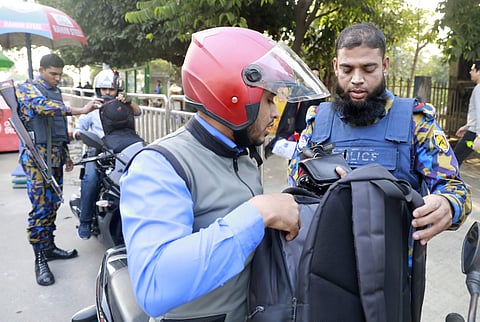

DHAKA: Campaigning ended on Friday for Bangladesh's December 30 general election as army troops patrolled the streets along with paramilitary forces and police with intensified nationwide security 48 hours before voting.
"I expect the law enforcement agencies to ensure security so the people cast vote freely to their desired candidates and return home safely," Chief Election Commissioner Nurul Huda said as the military and paramilitary forces set up makeshift camps across the country after being called out on election duty.
Huda asked security agencies to keep an extra vigil on religious minority communities during the voting on Sunday as media reports said at least three Hindu households were set on fire by miscreants between December 16 and 26.
"The elections, particularly in 2001 and 2014, appeared as a nightmare as far as minority communities were concerned, the situation is good this time barring the three arson attacks in Feni and Thakurgaon," Bangladesh Hindu-Buddhist-Christian Unity Council spokesman Kajol Debnath told PTI.
He said minority community leaders held a series of meetings with the Election Commission and law enforcement agencies who promised to pursue a 'zero tolerance' policy against any attack or intimidation.
Law enforcement agencies in major cities are checking vehicles as part of their vigil as some 600,000 security personnel including several thousand soldiers and paramilitary border guards were deployed across the country.
But overnight violence saw the death of an activist of the ruling Awami League and arrests of several opposition workers as Prime Minister Sheikh Hasina seeks to retain power for a third consecutive term while Bangladesh Nationalist Party (BNP) of jailed ex-premier Khaleda Zia is its main rival.
The BNP has stayed out of the parliamentary process since 2014 when it boycotted the last general election over its demands for a poll-time non-party government.
It returned to parliamentary politics as part of a new alliance - National Unity Front (NUF) - that was cobbled together three months ago with eminent lawyer Kamal Hossain as its convener.
But the party is in a state of disarray in the absence of its two top leaders Zia and her fugitive son Tarique Rahman who is the acting party chief.
Zia, 73, is serving a 10-year prison term on graft charges while Rahman is living in London ostensibly to evade the law as a court has sentenced him to life imprisonment for masterminding a grenade attack on a rally in 2004 that killed 24 Awami League leaders and activists.
The opposition, however, said they are facing violent attacks and intimidation, including arrests that has affected their electioneering.
Awami League's election posters are plastered on walls and poles across the country but those of opposition candidates are barely visible as they alleged that the police have created an atmosphere of fear to debar their supporters from staging street campaigns.
At least six people have been killed in poll-related clashes since the campaigning began as Awami League claimed that five of them were its supporters while BNP alleged that over 12,000 opposition activists including several candidates were injured in attacks by the ruling party's activists.